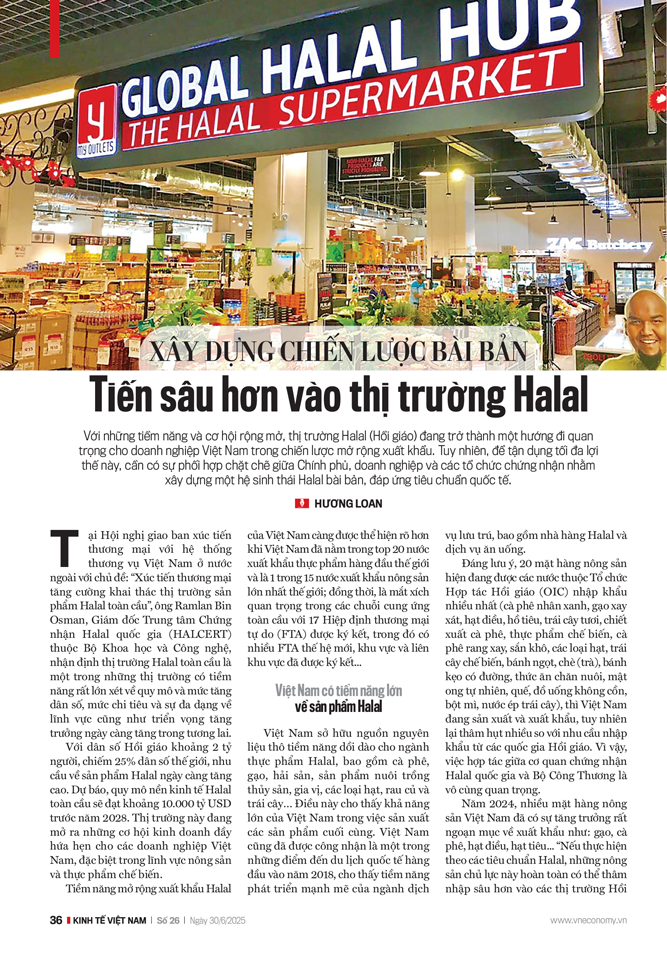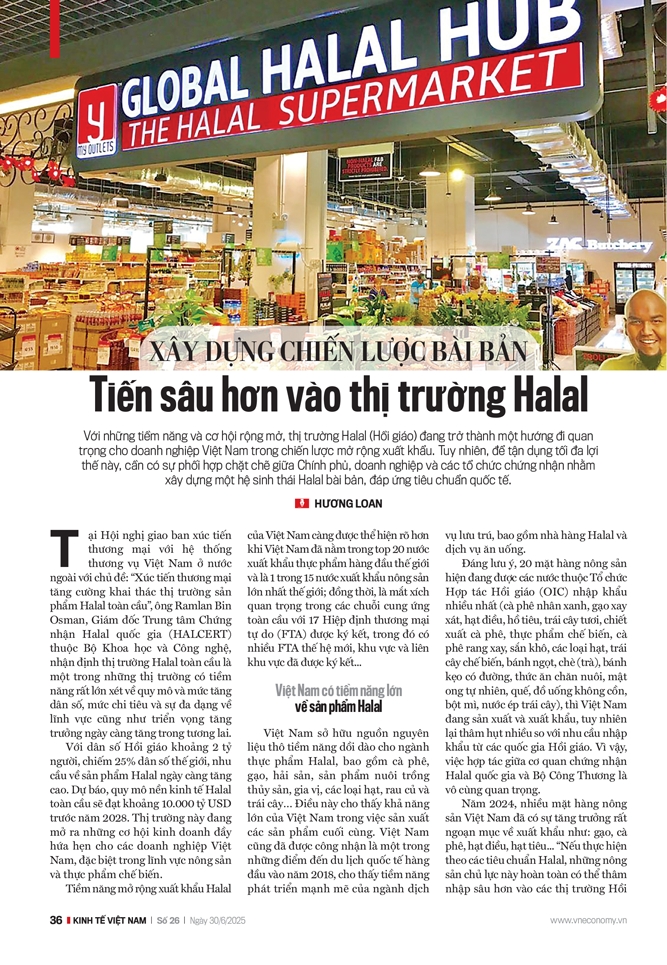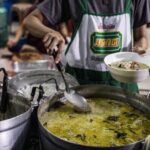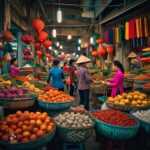At the Trade Promotion Conference with the Vietnamese Trade Office Abroad on the theme of “Trade Promotion to Enhance Global Halal Market Exploitation,” Mr. Ramlan Bin Osman, Director of the National Halal Certification Center (HALCERT) under the Ministry of Science and Technology, assessed that the global Halal market is one of the markets with significant potential in terms of scale and population growth rate, spending power, and diversity in fields as well as increasing prospects for future growth.
With a Muslim population of about 2 billion, accounting for 25% of the world’s population, the demand for Halal products is increasing. It is forecasted that the global Halal economy will reach about 10,000 billion USD by 2028. This market is opening up promising business opportunities for Vietnamese enterprises, especially in the fields of agricultural products and processed food.
Vietnam’s potential for expanding Halal exports is even more evident as the country is already among the top 20 food exporters in the world and one of the 15 largest agricultural product exporters. At the same time, it is an important link in global supply chains with 17 signed Free Trade Agreements (FTAs), including many new-generation, regional, and inter-regional FTAs.
LARGE POTENTIAL FOR HALAL PRODUCTS
Vietnam possesses a diverse range of raw materials for the Halal food industry, including coffee, rice, seafood, aquaculture products, spices, nuts, vegetables, and fruits. This indicates Vietnam’s significant potential in producing final products. In 2018, Vietnam was also recognized as one of the world’s leading international tourism destinations, showcasing the strong potential for developing accommodation services, including Halal restaurants and catering services.
Notably, out of the 20 agricultural products currently imported the most by the Organization of Islamic Cooperation (OIC) countries (including green coffee beans, milled rice, cashew nuts, pepper, fresh fruits, coffee extracts, processed food, roasted coffee, dried cassava, nuts, processed fruits, pastries, tea, confectionery, animal feed, natural honey, cinnamon, non-alcoholic beverages, wheat flour, and fruit juices), Vietnam is already producing and exporting many of these products. However, there is a significant deficit compared to the import demands of Islamic countries. Therefore, collaboration between the national Halal certification agency and the Ministry of Industry and Trade is of utmost importance.
In 2024, many Vietnamese agricultural products witnessed remarkable export growth, including rice, coffee, cashew nuts, and pepper. “If these key agricultural products comply with Halal standards, they can definitely penetrate deeper into Islamic markets,” said Mr. Ramlan Bin Osman, who also believed that with the potential of agriculture, Vietnam has a great opportunity to participate in the global Halal food market, currently valued at 2,000 billion USD, but there is a significant gap between the supply and demand of Halal products.
Therefore, to seize the opportunity, maximize its potential, and become one of the world’s leading Halal food producers and suppliers, Vietnam needs to learn from the experiences of some leading Halal food exporting countries in building a Halal ecosystem. In reality, many non-Islamic countries have become the world’s leading suppliers of Halal products, notably Australia, Brazil, and South Korea.
“With its strong potential, I believe Vietnam will join this list of non-Islamic countries providing the largest Halal products. As a result, the value of Halal products will become a new source of revenue and a new pillar in Vietnam’s GDP structure,” emphasized Mr. Ramlan Bin Osman. According to him, the fastest way to approach the Halal market is to meet Halal standards. More importantly, from farm to table – throughout the process and materials must be Halal.
SUPPORT POLICIES TO PROMOTE EXPORTS
According to Deputy Minister of Industry and Trade Nguyen Sinh Nhat Tan, the global Halal market presents a significant opportunity for Vietnam’s export goods. With a total market value of 2,000 billion USD, Vietnam only needs to capture a 10% market share to gain substantial benefits. If we strive within five years with the current growth rate, Vietnam’s exports can definitely occupy a significant share in the global Halal market.
Mr. Le Phu Cuong, Director of the Vietnam Trade Office in Malaysia, affirmed that the demand for Halal products among the Islamic community is enormous. However, obtaining Halal certification for exports is another matter. Halal certification is not mandatory for imports into Malaysia. Nevertheless, many importers, distributors, and retailers prefer products with this certification to cater to the majority of local consumers, as the Muslim population in this country accounts for 60%. Therefore, most preferred products must have Halal certification.
Indonesia is a country with a significant demand for Halal product imports. According to Mr. Pham The Cuong, Commercial Counselor of Vietnam in Indonesia, the Halal certification of Indonesia is also considered a non-tariff barrier due to lengthy approval procedures, high costs, short validity, and complexities for small and medium-sized enterprises. Meanwhile, the number of units authorized by Indonesia to issue certificates is very limited. Only one unit has been authorized, and it only applies to food, while the certification process is quite complicated, requiring food safety to be maintained throughout the supply chain rather than just at the input stage…
Along with the limited understanding of businesses regarding the Halal certification process, there is also competition from other countries. Therefore, enterprises need to proactively obtain Halal certification and the Indonesian National Standard (SNI) certification. They should also actively collaborate with relevant Vietnamese agencies in case Indonesia initiates trade defense measures related to their products to protect their interests.
Mr. Tran Trong Kim, Commercial Counselor of Vietnam in Saudi Arabia, proposed that state management agencies and local authorities should provide guidance on procedures and processes for Halal certification and mutual recognition of Halal certification. This is because many countries do not directly recognize products from enterprises but require third-party certification. Along with this, there should be more focus on attracting foreign investment and building Halal standards-compliant facilities.
Enterprises need to invest in production lines that meet Halal standards and approach Halal certification organizations for consultation and advice. In addition, enterprises should actively participate in promotional activities for Vietnamese Halal food, such as specialized fairs, focusing on high-quality Halal products. Mr. Kim noted that to avoid trade disputes, enterprises need to verify and check partners before transactions, sign non-cancellable contracts, and make advance deposits to ensure safety…
Emphasizing the challenges, Mr. Truong Xuan Trung, Director of the Vietnam Trade Office in the United Arab Emirates (UAE), stated that the understanding of Islamic regulations and Halal standards in Vietnam is still limited. The Halal certification process in Vietnam is currently complex and lacks harmony with international standards. Moreover, the shortage of personnel with expertise and understanding of Halal standards is also a significant challenge for the Halal industry in Vietnam.
Mr. Trung proposed completing the legal system on Halal, including the recently signed Vietnam-UAE Comprehensive Economic Partnership Agreement (CEPA), which is expected to promote trade between the two countries. On the other hand, it is necessary to strengthen cooperation with Islamic countries on Halal certification, support policies to promote Halal product exports, prioritize policies, and allocate budget for Halal product manufacturing…
The full content of the article was published in the Vietnam Economic Magazine, Issue 26-2025, released on June 30, 2025. Please find the article here: https://postenp.phaha.vn/tap-chi-kinh-te-viet-nam/detail/1473

Unleashing a New Export Market: Tapping into a $2 Trillion Opportunity.
The food industry is set to boom, with an estimated spend of $15 trillion by 2050. However, Vietnam currently has only 20 products in this market. There is a huge opportunity for growth and expansion, and with the right strategy, Vietnam can tap into this lucrative industry and increase its market share.




















